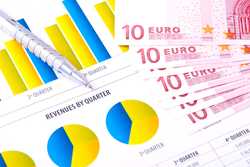Bounced Check: What Is It? How Long Does It Take to Bounce?

Our evaluations and opinions are not influenced by our advertising relationships, but we may earn a commission from our partners’ links. This content is created by TIME Stamped, under TIME’s direction and produced in accordance with TIME’s editorial guidelines and overseen by TIME’s editorial staff. Learn more about it.
While paper checks aren’t as prevalent as they once were, there are still many people who use checks—paper or the e-check kind—to pay bills or make purchases. But if there isn’t enough money in your bank account, or if there is something technically wrong with your check’s information, the transaction may be rejected. This is called bouncing a check.
A bounced check can be frustrating and, in some cases, embarrassing. It can also create a cascade of financial impacts. Here is a look at what bounced checks are, how they happen, and the ways you can avoid them and their penalties.
Banks will decline to process check payments when there is a problem with the account, the check, or both. This bounced check can be due to:
In some cases, a bank will still process a check from an account with insufficient funds. This depends on factors like the check amount and whether your account has overdraft protection.
When a check payment bounces, the bank will notify the merchant that the transaction has failed. Sometimes this processing doesn’t occur until a few days after the check has been cashed.
Because there can be a bit of a lag, you may have thought that the payment was processed. After it’s rejected, though, any applicable funds will be pulled back from the merchant.
You and the merchant will be notified of the rejected payment. You’ll need to make new payment arrangements and, if applicable, pay any fees imposed by your bank or the merchant for the bounced check.
The impact of a bounced check, even if unintentional, can be pricey and has a tendency to compound.
First, you’ll have to deal with processing your payment again with the merchant in question. If you are paying a bill—such as a mortgage, utility, or auto loan—you may now find that your payment is past due and you’ll incur late charges.
There can also be multiple fees (more on those below). Depending on the circumstances, your merchant may even choose to report the late payments to a credit bureau. And in many cases, you may be required to use another form of payment for a period of time, especially if you’ve had multiple payments returned.
Depending on your bank and your account’s features, you will likely incur fees from your own financial institution following a bounced check. The two most common fees are overdraft fees and non-sufficient funds (NSF) fees.
An overdraft fee is one that’s charged if you overdraw your account, or make purchases that exceed your current account balance. When it comes to writing checks, an overdraft applies if your bank still allows the payment to process, even though it puts your account into the negative. You’ll be responsible for not only repaying the bank for the overdrawn amount, but also covering an overdraft fee (up to $36 per instance) for the convenience.
Some banks and online financial institutions—among them, Chime and Quontic—don’t charge overdraft fees. Instead, they offer fee-free overdrafts and/or will temporarily spot the excess amount for a short period of time, until you can make a new deposit.
Even if your bank rejects the payment, though, you can still incur NSF fees. These fees (averaging $34 each) are applicable when you don’t have sufficient funds in your account to cover the processing of a check or electronic payment. Your bank may try to reprocess the charge before ultimately denying it, and add an administrative fee to your account for the trouble.
To add insult to injury, you’ll probably incur fees from the inconvenienced (and unpaid) merchant, as well as from your bank.
Once the payment is clawed back, the merchant may charge you a late fee if one applies to your account. You can also expect a returned-check charge in many cases, which helps the merchant cover any lost processing fees and the inconvenience of having their own account unexpectedly debited.
While some people intentionally write hot checks (or make payments from an account that they know has insufficient funds), many bounced checks are simply the result of unexpected debits or cash flow confusion. Still, there are some steps you can take to avoid bounced checks and their hefty fees.
One of the best ways to ensure that small transactions never knock your account into the red is to keep a little extra in that account at all times. You should aim to keep at least a month’s worth of expenses in your bank account, along with a buffer of $300 to $500. This will protect you if you forget a check or automatic payment.
You’re probably already budgeting your way through the month to track your spending and manage funds. Also tracking your cash flow can be a great way to see when your account will be at the lowest (like when you pay rent or a mortgage payment) or highest (when your paycheck hits) each month. In some cases, a written check could only be a single day away from approved versus rejected.
Checkbook registers aren’t just for grandparents. You can use one—or a handy budgeting app—to track all of your spending, bills, and written checks through the month. This way, a payment never goes forgotten and you can be sure that you always have enough cash on hand to cover transactions.
If a check or electronic payment does slip past or surprise you, enrolling in your bank’s overdraft protection feature can save you some fees and headache. While you may still incur some penalty charges, your payment won’t be rejected, so you’ll save money on the merchant end. Some of the best checking accounts will even allow you to connect a savings account that will be automatically debited to cover overdrafts, so you won’t have any penalties.
Tracking each and every transaction you make throughout the year can be difficult. Sometimes a check or electronic payment can slip through the cracks. If that payment was made by check, it could be rejected by your financial institution, resulting in a bounced check and additional penalty fees. To avoid this, be sure to not only budget but track your cash flow and spending throughout the month, and even consider keeping a buffer in your bank account for surprises.
A cashier’s check is one that is secured and verified by the financial institution that issues it, so it is highly unlikely to bounce. If something does happen before the payment is processed, the bank itself is on the hook for the rejected payment.
If you are paying a bill with a check that bounces, there’s a chance that your payment will be late once that transaction is clawed back. This could potentially result in the merchant reporting your payment as late to the credit bureaus, which will lower your credit score and could follow you for up to seven years.
A bounced check will result in a rejected payment, as well as fees from your financial institution and often, from the merchant you were trying to pay. You may also incur late fees, depending on the situation, and could even have the late payment reported to the credit bureaus. You’ll also need to resubmit the payment (sometimes in another form) to the merchant once the check bounces.
The information presented here is created by TIME Stamped and overseen by TIME editorial staff. To learn more, see our About Us page.



